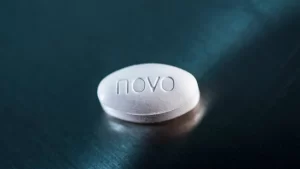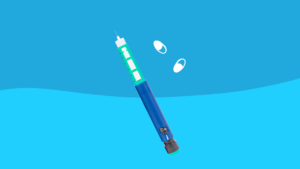Vitamins For Energy: Does B-12 Work?
HOME | DIABETES EDUCATION | VITAMINS FOR ENERGY: DOES B-12 WORK?
Do you feel like you need an energy boost?
Vitamin B-12 has been touted as a miracle nutrient for increasing energy, memory and mood. But does it work? Vitamins for energy?
In this article, we’ll explore the essential role of Vitamin B-12 in health and its potential to improve your energy levels, memory and mood. We’ll also look at top sources of Vitamin B-12, the signs of deficiency and potential side effects of high doses.
So read on to find out if taking Vitamin B-12 is right for you!
Overview
Taking a vitamin B-12 supplement can be like pouring gasoline into an empty tank – without it, you run out of energy quickly.
Vitamin B-12 is one of the eight B vitamins and is essential for good health. It helps convert food into glucose for energy, produces DNA, and red blood cells, and regenerates bone marrow, which all play a role in keeping your body energized.
As we age, our bodies produce less acid in the digestive system, making it more difficult to absorb vitamin B-12 naturally found in animal-based foods. This can lead to a deficiency that causes fatigue and other symptoms.
While there are claims that taking extra vitamin B-12 supplements can help increase energy levels or improve memory and mood, the evidence is not supported by clinical evidence. Taking megadoses of this nutrient can even cause side effects such as nausea or headaches and is unnecessary since the recommended daily amount for adults is only 2.4 mcg per day.
For those who have low levels due to poor diet choices or health conditions like pernicious anemia, supplements may be helpful but should always be taken under a doctor’s guidance because they could interact with medications or alcohol and tobacco use.
Older adults are particularly at risk of having seriously low levels of vitamin B-12 since their bodies might not be able to absorb enough through food sources alone. Up to 20% of individuals over age 50 are estimated to have borderline levels while more than 3% may have dangerously low amounts which means adding a supplement could make all the difference in how energized they feel each day.
With so much on the line when it comes to energy production within your body, finding ways to get adequate amounts of this important nutrient is key…
Vitamins for Energy Sources
If you’re looking for a natural way to boost your energy levels, look no further than vitamin B-12. This essential nutrient is found naturally in animal products such as shellfish, liver, fish, crab, and red meat. For those on vegan or vegetarian diets, fortified soy products, fortified cereals, low-fat dairy products like cheese and yogurt, eggs and nutritional yeast are good sources of vitamin B-12.
The best way to get your daily intake of B-12 is to plan out meals that include these foods or take supplements. B-12 can also be taken as an injection if recommended by a healthcare provider.
B-12 has many benefits for the body including its ability to help convert food into glucose for energy production and its role in generating DNA and red blood cells. It’s also important for maintaining a healthy nervous system and preventing megaloblastic anemia caused by deficiency. Since older adults may have difficulty absorbing dietary sources of vitamin B-12 due to reduced acid production in the digestive system, they must pay special attention to their recommended daily amount.
The recommended daily amount of vitamin B-12 is 2.4 mcg for adults but taking megadoses of this nutrient is unnecessary and can lead to side effects such as headaches or dizziness. While some studies suggest that B-12 can improve energy levels and cognitive function, more research is needed before any definitive conclusions can be made about its effects on mood regulation or memory improvement.
As with all supplements, however, it’s important to consult with your doctor before taking them as interactions with certain medications or alcohol could occur. Moving forward with the right information about vitamin B-12 can ensure you get enough of this essential nutrient without overdoing it – so let’s take a look at how much you should aim for each day!
Recommended Amount
Getting the right amount of vitamin B-12 is key to feeling your best, so it’s important to know how much to aim for each day!
The recommended daily amount of vitamin B-12 for adults is 2.4 mcg. However, older adults may need more due to reduced acid production in their digestive systems.
Vitamin B-12 can be found naturally in animal-based foods like shellfish, liver, fish, crab and red meat as well as fortified cereals and nutritional yeast. Additionally, there are supplements available in various forms such as pills or injections.
It’s important to note that taking megadoses of vitamin B-12 can cause side effects and is unnecessary since only a small amount is needed each day.
It’s also worth noting that more than 3% of adults over age 50 have seriously low levels of vitamin B-12 and up to 20% may have borderline levels. A deficiency can cause symptoms like fatigue, weakness and tingling in the hands and feet which can be sneaky and harmful if left unchecked.
With this information in mind, it’s clear why getting the appropriate amount of this essential nutrient every day is so important for overall health and well-being. Moving forward with an understanding of these facts will help you make informed decisions about your dietary needs going forward.
Benefits and Claims
You may have heard of the potential benefits of vitamin B-12 – from improving memory to regulating mood – but it’s important to know that these claims are not supported by clinical evidence. Taking megadoses of vitamin B-12 is unnecessary and can cause side effects, so it’s best to follow the recommended daily amount for adults of 2.4 mcg.
While there is some research showing a link between higher levels of B-12 and improved cognitive performance, more studies are needed to confirm this association. But, although taking extra doses will not give you an energy boost or other health benefits, getting enough B-12 in your diet is still important as a deficiency can be dangerous and harmful.
Vitamin B-12 deficiency can lead to symptoms like fatigue, weakness and tingling in the hands and feet, as well as anemia caused by reduced red blood cell production. This is why it’s especially important for older adults who often have lower levels due to reduced acid production in the digestive system, vegans/vegetarians with limited dietary sources of the nutrient, and people with pernicious anemia or other conditions that impair absorption.
Vitamin B-12 supplements can interact with certain medications such as metformin for diabetes treatment or proton pump inhibitors for acid reflux, so always check with your doctor before taking them.
The top 12 foods high in vitamin B-12 include shellfish like clams, mussels, crab and lobster; liver; fish like salmon and tuna; fortified soy products; fortified cereals; lean red meat; low-fat dairy such as yogurt or skim milk; cheese; eggs; nutritional yeast which has become popular among vegans/vegetarians; beef jerky; and some breakfast sausages. Eating animal sources like these is the best way to ensure adequate intake since plant sources do not provide all forms necessary for absorption into our bodies.
So, while additional amounts won’t help give you a better mood or make you smarter overnight – eating foods rich in vitamin B-12 will help make sure your body gets what it needs!
Deficiency Risks
Not getting enough vitamin B-12 can be dangerous, with more than 3% of adults over 50 having seriously low levels. Deficiencies can cause symptoms like fatigue, weakness, and tingling in the hands and feet. Left untreated, vitamin B-12 deficiency can lead to megaloblastic anemia and neurological issues such as memory loss and confusion. It’s important to pay attention to your body if you think you may be deficient in this key nutrient.
Older adults are particularly vulnerable due to reduced acid production in the digestive system which makes it harder for them to absorb B-12 from food sources. Vegans and vegetarians may also need to supplement their diet with additional sources of this essential vitamin since most animal products are rich in B-12.
It’s important to talk with a healthcare provider about any supplements you take as they can interact with certain medications, alcohol, or tobacco use. The recommended daily amount of vitamin B-12 is 2.4 mcg for adults, so it’s best not to exceed that amount when taking supplements or injections unless specifically instructed by a medical professional.
Moving forward, let’s look at some of the top foods high in Vitamin B-12 that we should include in our diet for optimal health benefits.
Foods High in B-12
For optimal health, it’s important to include foods packed with Vitamin B-12 in your diet, like shellfish, liver, fish, crab, fortified soy products and cereals. Red meat can also offer some B-12 as can low-fat dairy products such as cheese and eggs. Additionally, nutritional yeast is a vegan option that is high in B-12.
Eating a variety of these foods will ensure you’re getting enough of this essential vitamin and avoid deficiencies. It’s important to note that vegetarians or vegans may need to take dietary supplements since they don’t get any animal sources in their diets. Since older adults are more likely to be deficient due to reduced acid production in the digestive system, they need to take extra measures by including adequate amounts of B-12-rich foods or supplements in their diet.
Vitamin B-12 deficiency can cause serious issues if left untreated so you must make sure you’re consuming adequate amounts from food or supplement sources. Moving on from here we’ll discuss supplementation options available for those who need an extra boost of Vitamin B-12 intake.
Supplementation – Vitamins for Energy
If you’re looking for an extra boost of Vitamin B-12 in your diet, supplementation may be the way to go! Supplements are available in various forms, including capsules and tablets, sublingual drops or sprays, and injections.
Taking megadoses of vitamin B-12 is unnecessary and can cause side effects. Here are a few things to consider when supplementing:
- Always consult with a healthcare provider before taking any supplements.
- Be aware that supplements can interact with certain medications, alcohol, and tobacco.
- Choose the right form of supplement for your needs – capsules and tablets are good for general use while injections may be necessary if you have difficulty absorbing B-12 from food sources due to pernicious anemia or other conditions.
Older adults are more likely to be deficient due to reduced acid production in the digestive system and should pay special attention to their intake since deficiencies can lead to symptoms like fatigue, weakness, and tingling in the hands and feet.
Supplements can help ensure that people get enough of this important nutrient without having to drastically change their diets – just make sure you do so safely under the guidance of a healthcare provider!
Frequently Asked Questions
How quickly does vitamin B-12 start working for energy?
You may have heard that taking vitamin B-12 can give you a boost of energy, but does it work?
Studies show that up to 20% of older adults may have borderline levels of this essential nutrient, and more than 3% of adults over age 50 have seriously low levels.
Supplementing with vitamin B-12 can help restore energy levels quickly, usually within a few days. However, the key is to take the right amount as megadoses are not necessary and can cause side effects.
Make sure to speak with your healthcare provider before beginning any supplement regimen.
What are the long-term effects of taking vitamin B-12?
Taking vitamin B-12 supplements can have beneficial long-term effects, such as helping improve the health of your nervous system and supporting red blood cell production.
It’s important to note that megadoses are unnecessary and can cause side effects, so it’s best to stick with the recommended daily allowance of 2.4 mcg for adults.
Vitamin B-12 deficiency can lead to serious health issues, so if you think you’re at risk due to dietary restrictions or age, it’s best to talk to your healthcare provider about supplementing with a trusted brand.
Are there any natural sources of vitamin B-12 other than animal-based foods?
Yes, there are natural sources of Vitamin B-12 other than animal-based foods.
Just like a sunflower turning its head to the sun for nourishment, you can find vitamin B-12 in fortified cereals and nutritional yeast. You can also get your daily dose from crab, fortified soy products, red meat, low-fat dairy, cheese, eggs, and beef.
The recommended daily amount of vitamin B-12 is 2.4 mcg for adults and it’s essential for brain function and mood regulation – so don’t let yourself become deficient!
Are there any potential side effects of taking high doses of vitamin B-12?
Yes, there are potential side effects when taking high doses of vitamin B-12. Taking megadoses is unnecessary and can cause adverse reactions such as headaches, dizziness, nausea, vomiting, constipation and diarrhea.
It may also interact with certain medications, alcohol, and tobacco, so it’s important to talk to your healthcare provider before taking any supplements. Additionally, it shouldn’t be taken by pregnant or breastfeeding women without consulting a doctor first.
How can I make sure I’m getting enough vitamin B-12 in my diet?
Getting enough vitamin B-12 in your diet is important for good health. The recommended daily amount of vitamin B-12 is 2.4 mcg for adults, and it can be found naturally in animal-based foods like shellfish, liver, and fish as well as fortified cereals and nutritional yeast.
To ensure you’re getting enough of this essential nutrient, try to include at least one serving of these foods into your diet each day. You may also want to consider taking a supplement if you’re vegan or vegetarian or have an increased risk of deficiency due to age or other factors.
However, be sure to check with your healthcare provider first before adding any supplements to your routine.
Conclusion
You’ve seen the evidence, and it’s clear: Vitamin B-12 is a key nutrient for your health. It can help boost energy levels, improve memory, and elevate mood.
But to get the most out of this vitamin, you need to know how much to take and where to find it. Eating foods rich in B-12 or taking supplements can ensure that you’re getting what your body needs.
Think of Vitamin B-12 as a magical currency in your body – one that will give you more energy when spent wisely. By understanding its benefits, keeping an eye out for deficiency risks, and stocking up on sources like eggs and fish, you’ll be able to make sure that all of your energy reserves are filled up!
References
Jiang, Bo et al. (2013, April 1). INTERVENTION EFFECT OF FOLIC ACID AND VITAMIN B12 ON VASCULAR COGNITIVE IMPAIRMENT COMPLICATED WITH HYPERHOMOCYSTEINEMIA / EFEKAT INTERVENCIJE FOLNOM KISELINOM I VITAMINOM B12 NA VASKULARNI KOGNITIVNI POREMEĆAJ KOMPLIKOVAN HIPERHOMOCISTEINEMIJOM. Journal of Medical Biochemistry, 33(2), 169-174. https://doi.org/10.2478/jomb-2013-0033
Association between Vitamin B12 levels and cognitive… : Medicine. (n.d). https://journals.lww.com/md-journal/Fulltext/2020/07240/Association_between_Vitamin_B12_levels_and.92.aspx
Darwish, Hala et al. (2015, August 1). Serum 25-hydroxyvitamin D predicts cognitive performance in adults. Neuropsychiatric Disease and Treatment, 2217. https://doi.org/10.2147/ndt.s87014



